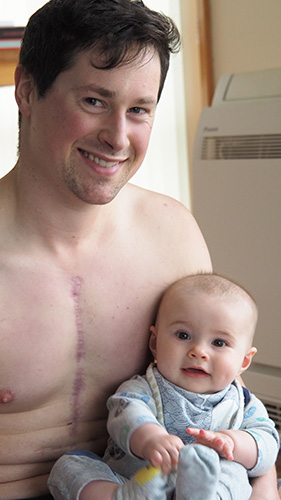I had two strokes before I turned 30 by Pat McConville
In December 2013, I had open-heart surgery. Three months later, I had a stroke.
But let’s go right back to the start of my story.
I was born with a congenital heart defect and underwent open heart surgery as a baby. Since that first procedure, I have been taking medication and it became part of my life. As a child, I was given a simplified reason for needing medication. Then when I transitioned to an adult specialist, everyone – including me – assumed I knew why I was taking it.
In 2013, at the age of 26, a routine check showed the main artery in my heart had widened. There was a risk of a rupture, so I was sent for preventive surgery. I received a mechanical heart valve at the same time.
Recovering from the surgery took three months. During this time, I experienced some strange episodes where my vision would spin and I had an odd sensation in my limbs, but these were put down to my blood pressure changing after surgery.
It was time for a change of scenery and a trip to a friend’s wedding in the rural north-west of Tasmania. Moments after the ceremony my life changed. I had a stroke. It was the most frightening thing that had ever happened to me.
My speech was slurred. I couldn’t form words or sentences, couldn’t keep my balance, and I couldn’t control some of my limbs. A friend rushed me to the local hospital where they went through the emergency checklist – antibiotics, a catheter, checking my heart, but I wasn’t diagnosed with a stroke until hours later when I was flown to Hobart.
I remained in hospital for five days, during which time my speech and balance came back naturally. I had been lucky to recover spontaneously, and without any permanent deficit.
I learned the stroke was from a blood clot and the odd episodes in the lead-up had been misdiagnosed. They were in fact TIAs or mini-strokes.
More importantly, I learnt that the “heart” medication I had taken since I was a child was to prevent blood clots. The surgery and recovery put me at higher risk of clots. It turns out my medication dose might not have been strong enough.
After more than 20 years, I finally knew how to ask somebody to explain my tablets to me.
But my story does not end here. Two years later, I had another stroke.
These symptoms were the same as my first stroke, but the most severe symptoms resolved after around 12 hours. Again, I spent five days in hospital, dodging another bullet. And again, I made an almost-full recovery. My main challenge today is an occasional hesitation in finding the right word in conversation.
I regard my first stroke as a warning that I needed to better understand my heart condition. At the time of the second stroke, I knew that my medication levels had been unstable. Some well-intentioned advice from someone who was not my normal doctor had sent my anti-clotting levels temporarily crashing. I learnt to back my own experience and judgement, and to be willing to seek another opinion if in doubt.
Another two years on, I had third, very minor stroke, this time causing double vision for a few days. Alongside my heart condition, stroke is now a risk I am conscious of. It is a possibility I live with and manage, and it has changed my perspective.
The support of my family, particularly my partner Liz, has been incredibly important to me. I am grateful for her patience, understanding and concern. My friends have also been supportive, although I don’t expect them to always “get” managing my stroke risk and why I need to take it easy at social events.
But I am more determined than ever to pursue my goals. In doing so, I trust myself and that I have a unique, insiders understanding of my own body – but I don’t hesitate to seek support, counsel, and help when I need it.

